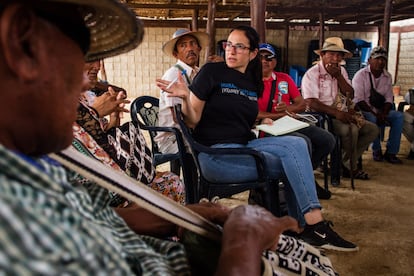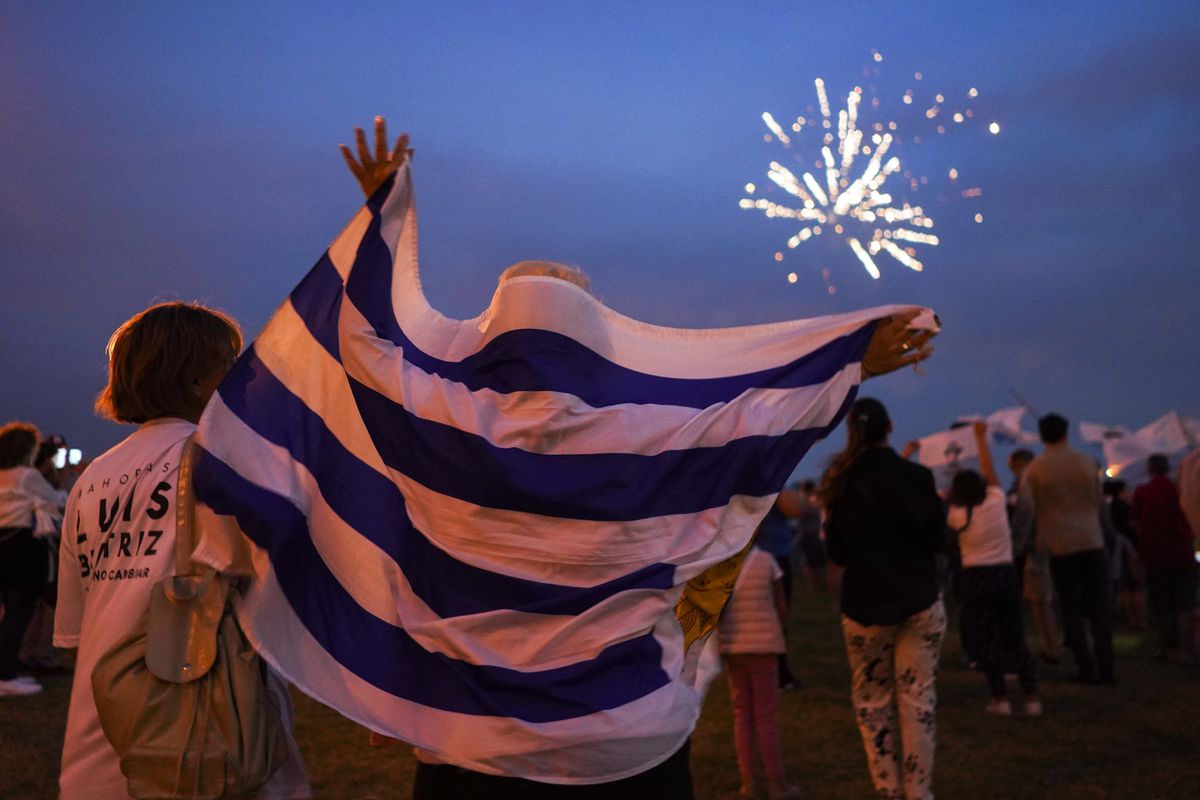Tamara Taraciuk, acting director of Human Rights Watch for the Americas. COURTESY
Latin America is facing a terrible moment in terms of human rights, the worst in “decades”, Human Rights Watch (HRW) has said in a report in which it warns of a setback of freedoms in the region, with attacks on judicial independence, police repression, threats to freedom of the press.
Tamara Taraciuk, HRW's acting director for the Americas, says that democracy is eroding in different ways and today the region is forced to defend spaces that used to be taken for granted.
"There is an alarming attempt to undermine judicial independence by certain governments and this is of great concern," warns Taraciuk, who points out that authoritarianism and populism "have no ideology."
From Mexico, with a government that defines itself as leftist, to Brazil, with an extreme right-wing president, several Latin American countries are seeing how their leaders follow the same script, regardless of their ideological positions.
Ask.
In the HRW report they speak of an "alarming" setback in basic freedoms in Latin America.
What is the most worrying?
Answer.
The different ways in which democracy is eroding in Latin America. It is difficult to make a ranking by country, but there are categories that concern us. On one side are the extremes. The cases of dictatorships such as Venezuela, Nicaragua or Cuba, where there are no free elections or democratic institutions that can put a brake on the Executive power. There is no judicial independence, there is no independent Congress.
There is also a group of governments, of leaders who come to power after democratic elections, but once there, they exercise it ignoring fundamental guarantees and the role of institutions.
They attack judicial independence, they attack the independent press and they adopt measures to hinder the work of civil society, of human rights defenders.
Governments such as Jair Bolsonaro's in Brazil, Nayib Bukele's in El Salvador, and Andrés Manuel López Obrador's in Mexico clearly fall into this category.
The authoritarian and populist script has no ideology.
From the right or from the left it is just as alarming, it is the same script despite starting from opposite ideological positions.
Q.
How do they attack judicial independence?
R.
There are different attempts to undermine it and these efforts are also of great concern.
Perhaps the most extreme case of the political use of the justice system has been in Bolivia, where the last three governments have used justice against their political opponents.
The most worrying aspect of this panorama are the different scenarios where the democratic spaces that it cost us so much to achieve in Latin America are shrinking.
Q.
Like which ones?
R.
Latin America lived through years of conflicts and dictatorships to begin to consolidate democracy and three points were essential for this: strengthen the justice system to investigate human rights violations and be able to act as a brake on the Executive power, allow freedom of expression and provide platforms for human rights organizations to monitor and challenge excesses of power. We are seeing different examples of how these three pillars are being affected.
In Brazil, criminal proceedings have been initiated against journalists for publishing uncomfortable information against the Government.
President Bolsonaro has blocked those who question his policies or his positions on social networks, and this is a serious measure because it affects the possibility of accessing public information.
In Mexico, there is a climate of hostility to the press that questions the government's abuse of power.
Practicing journalism is dangerous, 27 journalists have been murdered during López Obrador's term.
If there are no strong institutions that can investigate this type of crime, the indirect message that is sent is that this is allowed or that it does not have higher costs.
P.
There is also no strong pronouncement from the Executive on these crimes.
R.
It is not possible to establish a causal relationship between the apathy of the authorities regarding what is happening and the murders, but it does generate a climate that definitely does not favor tolerance and freedom of expression.
The authorities voluntarily put themselves in a place of exposure that requires greater tolerance, that is why criminal defamation, especially when it comes to public officials and especially when we talk about the president, goes against international standards of freedom of expression .
Q.
Is democracy in the region in danger?
R.
We are facing enormous risks. Perhaps the good news in this gloomy panorama is that despite all these setbacks and authoritarian tendencies that we are seeing, in the region there continues to be a strong response from independent journalism, from human rights defenders, even in countries like Nicaragua and Venezuela. or Cuba, with the thousands of people who took to the streets in July [2021] to put a stop to these excesses.
In some countries where there are democratic institutions, such as Brazil, it has been the judges who have put a stop to Bolsonaro's outbursts.
For example, the Supreme Court of Justice limited the president's attempts to throw overboard the efforts of governors to maintain social distance during the pandemic.
We have seen different efforts that have tried to stop these excesses of power and abuse.
While democracy is definitely at risk, those efforts are welcome news.
P.
In Cuba and Colombia they have used the protest to demonstrate precisely against the abuses of power and the response of the governments has been repression.
R.
The fact that people go out to protest has to do to a greater or lesser extent with an attempt to defend rights and this is good news that has to do with the civic culture that shows that in Latin America many people still think that democracy It is the best vehicle we have. In Cuba, we are facing a dictatorship where fundamental rights have been limited for decades and it was expected that the response of a regime like the Cuban would be repression, which occurred not only in what we saw in July of last year but in what we are seeing now. More than 200 people have been put on trial, in many cases for the crime of sedition, which in Cuba criminalizes the act of "disturbing the socialist order." They are trials that take place behind closed doors, without independent defense lawyers, and can end with up to 25 years in prison.These are absolutely disproportionate penalties that violate fundamental rights.
In Colombia, HRW documented at least 25 murders at the hands of the police, arbitrary arrests, physical abuse, including sexual.
These were not isolated cases but rather a structural failure of the Colombian police force, the only one in the region that reports to the Ministry of Defense, which has made accountability for these abuses difficult.
Tamara Taraciuk, acting director of Human Rights Watch for the Americas, in an indigenous reservation in La Guajira, Colombia. COURTESY
P.
President Iván Duque promised "zero tolerance" to abuses by the police, but there are only two officers removed from their positions.
R.
There are structural flaws in the Colombian police that are still a matter to be resolved.
Similar to Colombia is what we found in Peru, after the November 2020 repressions, and in Chile, after the October 2019 repressions, where there are structural flaws in the police forces that facilitate this type of response to protests. They were mostly peaceful.
Q.
Another crisis facing the region is migration. What are the challenges in this regard?
R.
One has to do with the situation of Venezuelans. There are more than 6 million who left their country and the vast majority are in Latin America. This creates an enormous challenge for the host countries and for the Venezuelans who find themselves in that situation, who struggle to obtain a status that guarantees them access to the health system, sending children to schools, being able to report crimes of who are victims without fear of being deported and being able to work legally. In this sense, something super important happened in Colombia and it was the decision to create the Temporary Protection Statute for the almost two million Venezuelans and returnees who are in that country. The situation is different in other places like in Chile, where we document cases of Venezuelans who are deported without due process, or in Peru,where there is a climate of intolerance towards migrants.
P.
Colombia is the country that has welcomed the most Venezuelans, but HRW said in the report that it needed to take one more step, which one?
R.
I was in Cúcuta accompanying the walkers in November, many years ago I did it for the first time and you saw the Venezuelan migrants walking next to the route, a journey that is difficult, the journey is complicated: the extreme temperatures, the exposure of violence by armed groups, recruitment, especially of minors.
It is very distressing to see three or four years later that walkers are still part of the landscape of the Colombian routes.
What we are trying to promote is that bus transport be guaranteed, which allows people not to have to submit to the risks of traveling on foot.
We hope that Colombia can take another step in that direction.
P.
There is also the migration of Central Americans, Haitians.
How do you evaluate this other crisis?
R.
_ The vast majority of migrants entering Mexico from the south are Central Americans, both from countries in the northern triangle and Nicaraguans. There are more than 110,000 Nicaraguans who have left since the 2018 crisis began, but there are also Venezuelans or Cubans who cross through Mexico. The Government of Joe Biden has a different discourse on human rights than the Government of Donald Trump; however, migration policies continue to be of great concern. At the border, policies continue to be applied that prevent migrants from presenting their cases and also force them to wait on the Mexican side of the border, and it is in this waiting that they are victims of extortion, of abuse by the authorities, of violence.
P.
This year there will be presidential elections in Brazil and Colombia, what is at stake for Latin America in these elections?
R.
The greatest concern is in Brazil because Bolsonaro has brought to light totally unfounded allegations of electoral fraud, questioning whether he will accept the results if he loses.
That is worrying because it would be following the script of Trump in the United States or Keiko Fujimori in Peru, which put democratic institutions at risk.
P.
_
How is Argentina in terms of human rights?
R.
There are structural problems that include difficult prison conditions, abuses in detention, violence against women, in addition to the erratic foreign policy in terms of human rights that the Argentine Government has had, which has abstained or has voted against in resolutions at the OAS on the situation in Nicaragua or Venezuela.
They questioned the police repression in Colombia, but they have not done the same with that of Cuba.
Q.
And Chile?
R.
One of the big issues, as in Colombia, is police reform, where although there has been progress, a structural reform of the internal disciplinary system of the carabineros is still necessary so that they have independence, a profound reform of the protocols of use of force.
P.
The HRW report analyzes 100 countries, is authoritarianism and attacks on the press and judicial independence an exclusive problem in Latin America?
A.
Autocracy is on the rise all over the world and to counter it, democratic leaders have to do a better job of defending and protecting democracy, inside and outside their borders.
Subscribe here to the EL PAÍS América
newsletter
and receive all the key information on current affairs in the region



/cloudfront-eu-central-1.images.arcpublishing.com/prisa/MYQ5IMFXJZF4NGVYA5PCRZJJCM.JPG)
/cloudfront-eu-central-1.images.arcpublishing.com/prisa/RHYRDMQQ7BG5JOUSKAXBLKE6YE.jpg)

/cloudfront-eu-central-1.images.arcpublishing.com/prisa/GZBJJXO3EZE2HLSP5ZRRKYYYOY.JPG)






/cloudfront-eu-central-1.images.arcpublishing.com/prisa/KMEYMJKESBAZBE4MRBAM4TGHIQ.jpg)

